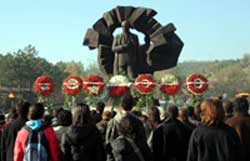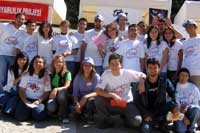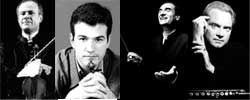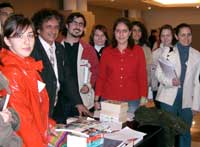Atatürk Commemorated


November 10, 2006, marks the 68th anniversary of the death of Turkey's beloved Atatürk.
Last week, on Friday, November 10, a program in memory of Atatürk was held on campus. The
program began at the Bilkent Atatürk Monument with a moment of silence and continued with
a performance by the Bilkent Quartet. At the Commemoration, Prof. Hasan Erten, Dean of the
Faculty of Science, gave a speech in memory of Atatürk focusing on Atatürk and Science.
Prof. Erten began his speech with Atatürk's famous quote: "For everything in this
world, for civilization, for life, for success, the truest guide is knowledge and science.
To seek a guide other than knowledge and science is a mark of heedlessness, ignorance, and
aberration."  Prof. Erten noted the significance of Atatürk's words and added that in
today's world, where communication and technology continue to advance, successful
countries are those who support scientific research. Prof. Erten continued with other
quotes from Atatürk on science and education and discussed his important role in
establishing science in Turkey, his revolutions, the university reform of 1933 and his
personality. Prof. Erten concluded his tribute with words from İlhan Demiraslan poem:
"Atatürk." Prof. Erten noted the significance of Atatürk's words and added that in
today's world, where communication and technology continue to advance, successful
countries are those who support scientific research. Prof. Erten continued with other
quotes from Atatürk on science and education and discussed his important role in
establishing science in Turkey, his revolutions, the university reform of 1933 and his
personality. Prof. Erten concluded his tribute with words from İlhan Demiraslan poem:
"Atatürk." In the beginning I spoke the name
of Atatürk
And did up my buttons.
How shall I say he is dead?
My Atatürk is before me,
He lies asleep in the snow,
His fur cap on his head.
How shall I say he is dead?
My Atatürk walks to Kocatepe,
Lost in thought, musing,
His hand on his chin.
How shall I say he is dead?
My Atatürk is teaching
At the blackboard,
White chalk in his hand.
How shall I say he is dead?
He has set out,
He is walking among the crowds,
His new hat on his head.
How shall I say he is dead? How?
A ray of light has struck his face,
My Atatürk is looking on.
Let us make ourselves presentable.
TDP Project
Seeking Dedicated Volunteers

 The TDP is a
project by Bilkent students which allows students to volunteer in several activities, such
as tutoring elementary school students in underprivileged areas, teaching sports, art, and
computer classes, or visiting elderly people in retirement homes. Bilkent News interviewed
Vehbi Çelme (IE/II) about one of the biggest volunteer organizations on campus, Toplumsal
Duyarlılık Projeleri and their future plans. (continues) The TDP is a
project by Bilkent students which allows students to volunteer in several activities, such
as tutoring elementary school students in underprivileged areas, teaching sports, art, and
computer classes, or visiting elderly people in retirement homes. Bilkent News interviewed
Vehbi Çelme (IE/II) about one of the biggest volunteer organizations on campus, Toplumsal
Duyarlılık Projeleri and their future plans. (continues)

Bilkent News Interactive is best viewed by 800x600 resolution.
You can send comments, questions, etc. about Bilkent News Interactive by clicking this
link.
|
Bilkent Symphony Concerts
Wrapping Up November


Great concerts continue to take place at the Bilkent Concert Hall in the fall. For the
final weeks of November, Bilkent Symphony Orchestra will present two marvelous concerts.
Mintcho Mintchev and Nikolai Mintchev will be the soloists for a concert on Saturday,
November 18. The famous violinists will play Concerto Grosso No.3 by Schnittke, followed
by Music Director Maestro Emil Tabakov conducting Symphony No.8 by Shostakovich.
In addition, the orchestra, led by Patrick Gallois, will present one of the Mozart Season
concerts on Saturday, November 25th. Gallois will also perform Mozarts flute concertos.
For more information please call ext. 2280 or 1775 Saturday, November 18 at 8 p.m. in the
Bilkent Concert Hall
Bilkent Symphony Orchestra
Conductor: Emil Tabakov
Violin: Mintcho Mintchev
Violin: Nikolai Mintchev
A. Schnittke / Concerto Grosso No.3
D. Shostakovich | Symphony No.8 in C minor Op. 65.
Saturday, November 25 at 8 p.m. in the Bilkent Concert
Hall
Bilkent Mozart Season
Bilkent Symphony Orchestra
Conductor: Patrick Gallois
F. J. Haydn | Symphony No.1 in D major
W. A. Mozart | Concerto for Flute No.1 in G major KV. 313
F. J. Haydn | Symphony No.3 in G major
W. A. Mozart | Concerto for Flute No.2 in D major KV. 314
Bedri Baykam Meets Students


On November 10th, Bedri Baykam, one of the most internationally well known artists and
intellectuals, visited Bilkent University for the seminar series, titled Youth in the
Future of the Republic, organized by Genç Aydınlanma Kulübü. During the seminar,
Bedri Baykam advised the students to appreciate the freedom that Mustafa Kemal Atatürk
gave them and to protect it to preserve the future of their children. After the seminar
Baykam answered our questions. (continues)
Also in this issue:

|







